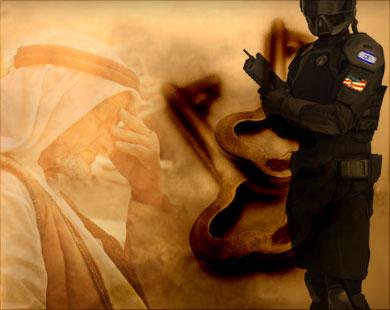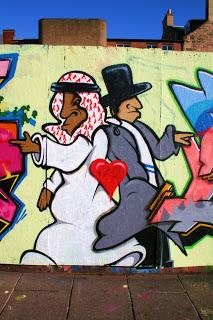“Thanks to the infidels!” That’s what the Jihadists and Islamic fundamentalists would say. Or “Thanks to the Americans!” That’s what the rest of the Islamic population would claim. Little does the Islamic world realize that “it” has been one of the major reasons for the ensuing bloodbath and violence in the region.

State of Affairs in Palestine (Photo: Gnuckx )
While to most Muslims, this previous statement might sound outrageous, the truth behind it is rather simple and reaches back as far as 632 AD to the death of Prophet Mohammed.With the death of the Prophet in 632 AD, the entire Muslim community was divided into two as to who must lead the Muslim world from there on.One of them, the Shia’s, were of the opinion that only a descendant of the Prophet will be knowledgeable and fit enough to interpret the Holy Quran and hence lead the Muslim world. The other group, the Sunni’s, however felt that the Quran can be read and interpreted by any trained scholar with a thorough knowledge of Arabic, the history of Islam and the Arabic world. Hence, they believed that the next leader or Caliph can be decided by a popular vote and need not be a direct descendent of the Prophet. This difference of opinion led to a civil war and to this day is the reason of a huge rift in the Islamic Community. For instance, the big players today in the Middle East affairs are Saudi Arabia, Jordan, Iraq and Iran. Saudi Arabia and Jordan are a majority Sunni community. Iraq and Iran on the other hand, are a majority Shia community (Saddam Hussein however was a Sunni Muslim). The difference of religious opinions between these communities, in their respective nations has prevented them from uniting under a common banner to fight the injustice happening in Palestine.The difference of opinion in the Islamic community notwithstanding, another severe issue that has posed as a constant serious threat to the Middle East peace dialog is the insecurity of the family of Saud and their power hungry neighbors which in the first place, led to the US monopoly over oil resources in the country.

Mural on "Peace in the Middle East"
(Photo: Michael Ramallah)
The country, which we today know as Saudi Arabia, was founded in the year 1926 by Abdullah bin Abdul Aziz ibn Saud. After the discovery of oil and the formation of ARAMCO, the Saudi King feared that his kingdom would be encircled by the neighboring countries Iraq and Jordan which was then ruled by the Hashemite who are direct descendants of the Prophet Muhammad (Jordan to this day is still ruled by the Hashemite, their ruler being King Abdullah who is a descendant of the Prophet Muhammad). Fearing a Hashemite invasion, King Saud forged an alliance with the US under which Saudi will provide continuous oil supply to the US under the condition that they provide them military support under the event of a Hashemite or any foreign invasion.The scenario today has however changed. Hashemite invasion is not a threat anymore to the ruling Saud family. Iraq is under US rule and Jordan is an ally of USA and will not dare attack Saudi. The real threat today, ironically, is their long time friend and ally, the United States of America because oil is what keeps the thousands of US forces and military bases all the around the world functioning. In case of an oil embargo by the Saudi government, like the one in 1970, US forces will not hesitate to invade Saudi Arabia, because oil, to the US government, is a national security issue, especially under current circumstances what with two wars being fought.
Hence, any move by Saudi Arabia that undermines the US authority in the region would lead to diplomatic clashes followed by a US invasion of the country. The Sheikhs don’t want that to happen. The people don’t want that to happen. Understandably so. And this is not only the case in Saudi, but also other wealthy Middle Eastern countries.
So the question now is what must they do? Confront USA? That would lead to nothing but even more bloodshed and would prove to be unproductive. What the people of these countries wish to do is their matter of internal policy. But these people must remember that they are bound morally and ethically to the people they claim are their “brothers” who live in Afghanistan and Iraq. Even if they do not have the fire power to confront a nation like the USA, they must at least own up to their part in all this politics and not scream from the roof tops like as though all hell breaks loose from USA or “infidels” in the language of the Jihadists and the fundamentalists.
